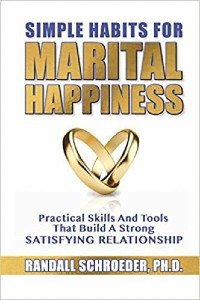Preview:
Dr. Randy Schroeder: If there’s one word that points out the difference between a happy marriage and an unhappy marriage, it is planning. You know, happy, successful couples plan to go to church this Sunday. They plan to give each other a meaningful hug, meaningful kiss today. They plan, “How are we gonna connect tonight? When are we gonna turn off the technology, and look each other in the eyes, and just talk?” They plan for dates together to strengthen their marriage relationship.
End of Preview
John Fuller: Insights from Dr. Randy Schroeder, and, uh, you’ll hear more, as he has some very practical advice to strengthen your marriage. Thanks for joining us today for Focus on the Family. I’m John Fuller, and your host is Focus president and author Jim Daly.
Jim Daly: John, I think everyone wants a happy marriage. I hope that, and, uh, there may be some listening or viewing that their marriages are at a place where it’s not about that. It’s just a matter of being together and sticking together. And we’re gonna cover some great material today that’s going to give you, uh, the handles to do better in your marriage. If you’re in a serious situation, please call us, and John will give those details. This is gonna be that kind of tune-up program for marriages that might be struggling a bit, but they’re on the right general path. But again, if you’re in a, a much more difficult place, give us a call, and we can help you there. Um, we are gonna cover some great content. You know, the Bible recommends a different path to happiness than what I think we in the Western world think about when it comes to happiness. Proverbs 4:5 says, “Get wisdom. Uh, get insight.”
John: Mm-hmm.
Jim: And Proverbs 19:8 says, “He who gets wisdom loves himself.” In other words, if you want to enjoy life and have a shalom, a peaceful life, uh, find practical knowledge for living. I think it all starts with our marriages.
John: Mm-hmm.
Jim: I mean, you want peace in your life, have a peaceful marriage, and everything else kind of cascades from there. So I’m looking forward to our program.
John: Right, and Dr. Randy Schroeder has been here before. Uh, he’s a pastor, a former seminary professor and, uh, a marriage and family counselor. He and his wife, Ginny, have been married for over 45 years, and they have two children and six grandchildren. And he’s written a number of books. Uh, the one we’ll talk about today is called Simple Habits for Marital Happiness: Practical Skills and Tools That Build a Strong Satisfying Relationship. Contact the ministry today for your copy of that book. Our number’s 800, the letter A, and the word FAMILY, or stop by focusonthefamily.com/broadcast.
Jim: Dr. Randy, it’s great to have you back.
Dr. Schroeder: Well, it’s great to be back, and I look forward to, uh, providing simple yet very effective habits for couples to improve and strengthen their marriage.
Jim: I love what you’ve said on earlier programs that we’ve done. You’ve written a book for parenting and a book on marital happiness here that we’re gonna talk about again today. We did a, a previous program on this, uh, but we’re gonna cover some of the other information here. And I’m so excited when we get a, a really good resource like this that is so sound, fundamentally. Okay. For the skeptic, the person out there going, “It’s not about happiness. It’s about joy,” and it’s true. I mean, being a Christian, you want a joyful life, but happiness counts, too. So just hit that for the, uh, the purists that are listening, that, uh, Dr. Randy, life is about joy, not about happiness.
Dr. Schroeder: Well, no marriage is consistently happy, or the … is happy every day, I should say. Uh, consistent marriage satisfaction is the goal. You know, you … We can have ups and downs, and, uh, and yet, uh, through habits, couples can have a strong, satisfying relationship. 80% of our behaviors are habits.
Jim: Yeah.
Dr. Schroeder: And couples that have a successful m-, happy marriage, uh, have a gratifying relationship, because they have daily healthy habits. They share loving words, loving actions every single day, and that keeps that relationship consistently happy.
Jim: Yeah. In that context, for the person listening, let’s assume it’s the wife who’s listening right now or viewing, and she can’t imagine that, you know, the … Some things have deteriorated in their relationship. They haven’t put basic fundamentals into play, and it’s just kind of on autopilot. Is there really hope for them?
Dr. Schroeder: There is definitely hope. I, I, Jim and John, I have helped more than probably 2,000 couples achieve a consistently satisfying marriage. The sad thing for most couples is every … Almost a hundred percent of couples want to have a happy marriage, but they don’t have the specific words, and actions, and knowledge to get there. And, and that’s what is lacking. Motivation is great, but if you don’t know how to do it, and what to say, and how to say it, and what to do on a daily basis, then, it makes having a happy marriage almost extremely difficult or impossible.
Jim: Well, I think we have laid the groundwork.
John: Mm-hmm.
Jim: Let’s get into the four daily essentials. Uh, these are things that, again, you mentioned early in the book for couples. Take us through the first two of those four essentials.
Dr. Schroeder: Well, the four daily essential habits are, are essential.
Jim: (laughs)
Dr. Schroeder: They need, they need to … (laughs) They need to happen. And, uh, what I have seen, uh, in troubled relationships, couples stop saying, “I love you.” And in fact, uh, complacency is the dreaded disease that can really damage a marriage or relationship. They become complacent, and they don’t say, “I love you,” every day. So the first daily essential habit is whoever, or whenever a spouse leaves the home, they need to say, “Goodbye. I love you.” Doesn’t make any difference if they’re going to work, they’re going to the grocery store, they’re going to the hardware store. They say, “Goodbye. I love you,” and then the other spouse needs to return or gets to return. It’s not a need to. It’s a get to. Uh, it’s a privilege. “I love you. Have a good day,” or, “Drive careful wherever you’re going.” And I … There’s a practical rhyme. I will never leave the house without hugging and kissing my spouse and saying, “I love you.”
Jim: (laughs) Okay.
Dr. Schroeder: And, and so that’s the first essential. The second one is, “Good night. I love you.” A lot of couples don’t go to bed at the same time, or if they do, you know, one will roll over first to go to sleep. Every night, whoever goes to sleep first will say, “Good night. I love you.” Uh, and then the, the spouse can return, “Good night. I love you.” And so there’s four I love yous every day, which overcomes that dreaded disease, or part of it, of complacency.
Jim: No. That’s good. I appreciate that. The third one is really, uh, about habits and developing those good habits. And you say the first five minutes of the day, number three comes into play. I’m keeping your rhyming going.
Dr. Schroeder: (laughs)
John: (laughs)
Jim: But, uh, hit it. What’s number-
Dr. Schroeder: Good job. Good job.
Jim: What’s number three?
John: You don’t say.
Dr. Schroeder: (laughs)
John: (laughs)
Dr. Schroeder: We’re rhyming all over the place.
Jim: (laughs)
Dr. Schroeder: Yeah. The, the, uh … So the first five minutes of the day, uh, set the tone for the day, not only for an attitude, but also for a marriage relationship. And so couples need to avoid the Cs. I stress that to parents. I stress that, uh, to couples, the correcting, criticizing, complaining, condemning. You know, I’ve heard thousands of spouses say, “You know, I wake up, and the first thing I hear is, ‘You forgot to put your coffee cup in the dishwasher last night.'” You know, it’s a, a criticism. And so the first five minutes, a, a spouse doesn’t have to be bubbly, joyful, but they need to avoid the Cs so they begin the day positively. That is a habit that needs to be in place.
Jim: We’re gonna, uh, go a little deeper with each of these. So for people going, “Ah. I wanna hear more about that,” we will in a minute. So hang on. Uh, habit four is how you end the day with your spouse, other than, “I love you.” You call it the two within 20.
Dr. Schroeder: Yes, sir. It’s spending two minutes together within the first 20 minutes that the last spouse arrives home after work or whatever. Uh, and so it doesn’t … Some spouses like to unwind. They like to go change their clothes, check the mail, do that. So it doesn’t have to be immediate, but at some point in those 20 minutes, they need to reconnect emotionally. They need to make that eye-to-eye heart connection. The eyes are the windows to the heart. Couples forget that. They need to look in each other’s eyes, spend two minutes checking out how the days, day went for both of them and giving a meaningful hug and kiss. Uh, that is a daily essential habit, is to give a ten-second hug, ten-second kiss every day. Uh, a meaningful hug and kiss happens in those two minutes within the first 20 minutes.
Jim: That seems pretty reasonable, two minutes. (laughs) I mean, if-
Dr. Schroeder: Yes, sir.
Jim: … to invest in your marriage. So …
Dr. Schroeder: Yes, sir.
Jim: But I’m guilty. I don’t do that every day. I do it some days and probably need to do it more days. (laughs) So I like this.
Dr. Schroeder: You, you, you, you and I are alike.
Jim: That’s a good reminder.
Dr. Schroeder: All, all spouses are imperfect.
Jim: Yeah.
Dr. Schroeder: Even though I’m a marriage expert, I don’t do it perfectly, either, Jim.
Jim: (laughs) Isn’t that the truth? Uh, complimenting your spouse is powerful. I think we know that. Sometimes, you know, I think we get a little wounded, so we pull back on that, I would say. It doesn’t have to be a severe wound, but maybe just a, a little nick, and then we don’t wanna compliment you for the next 24 hours. (laughs) Not that I’ve given a lot of thought to this.
Dr. Schroeder: Oh. You’ve got a friend who does this. (laughs)
John: (laughs)
Jim: (laughs) Yeah.
Dr. Schroeder: A friend.
Jim: But I, I guess many couples kinda lose that art, if I could call it that. What causes couples to stop appreciating one another?
John: Hmm.
Dr. Schroeder: It it is that complacency and just, they stop being a good finder. You know, they say-
Jim: A good finder?
Dr. Schroeder: Yes, sir.
Jim: I like that.
Dr. Schroeder: They’re, they’re not good finders. They, uh … It’s too easy to slip, due to our sinful nature, and become fault-finders. And so couples need to compliment each other every single day, and I think it’s good. I always define gratitude as saying, “Thank you.” It’s good to say, uh, healthier, I would say, to say, “I appreciate.” That lifts the spouse up, and that is praise. Praise creates positive energy in a marriage. And it’s interesting to me, every counseling session … I’ve done thousands and thousands of counseling sessions with couples. Every session I begin with a couple, I have them appreciate each other.
Jim: Hmm.
Dr. Schroeder: And it’s amazing to me how difficult that is for spouses. Now, I’m seeing troubled marriages-
Jim: Yeah.
Dr. Schroeder: … or marriages that are struggling and want to get stronger. Yet for a husband to tell his wife, “I appreciate,” and then I ask the wife, “Will you please always say, ‘Thank you for the compliment?'” And then, “Husband, will you please say, ‘You’re welcome,’ after you give the compliment?” And that, those three, uh, niceties are tough.
Jim: Let us-
Dr. Schroeder: It just doesn’t happen. It’s just unbelievable.
Jim: Yeah. Uh, tell us about your even/odd rule. What is that? This is another practical one.
Dr. Schroeder: That is a biggie. I, I see so many marriages that one spouse says, “My spouse is complaining about all our life issues.” Every person on the face of this earth has different issues going on. Now, it could be something like the brakes on the car need to be changed, okay, and, who’s gonna take the car to the shop to get the brakes changed? But couples can have, uh, 50% of their life positive by, uh, not talking about problems on even dates. When I think of the word even, I think of smooth, calm, tranquil, and so on. Even dates, they avoid problem talk, because some spouses have the tendency just to complain about everything every day. So there can be no complaints. You know, it just has to be positive. And then, on the odd dates, couples can talk about and kind of complain about work and complain about life issues. And it’s … They should only last for 30 minutes, at the most, an hour. So the rest of the evening together is positive.
Jim: Mm.
Dr. Schroeder: It’s coffee casual conversation. When I see, and I unfortunately have seen, uh, numerous cases of adultery. Uh, the betrayed spouse wants to talk about the affair every day, and rather than help the marriage get on the road to healing, and, and I’ve helped, uh, numerous marriages get over affairs and have successful happy marriages, they just don’t want to talk about that adultery every day. They do it every other day on the odd dates.
Jim: Mm.
John: This is Focus on the Family with Jim Daly, and our guest today is Dr. Randy Schroeder, uh, offering very, uh, biblical insights in his book, Simple Habits for Marital Happiness. Uh, it’ll really be beneficial to you and/or somebody you know, so get a copy of it from us here at Focus on the Family. Stop by focusonthefamily.com/broadcast or call 800, the letter A, and the word FAMILY.
Jim: Randy, that odd or even, what jumped in my mind is Jean and I were in the airport, and I, … Eh, you know, she accidentally drops the suitcase on my toe, and I got to first think-
Dr. Schroeder: (laughs)
Jim: … “Okay. This is an even day.” “Oh. Love, why would you have dropped that on my toe?”
Dr. Schroeder: (laughs)
John: (laughs)
Jim: And if it’s an odd day, “What are you doing dropping that on my toe?”
Dr. Schroeder: (laughs)
John: (laughs)
Dr. Schroeder: Now, we always have to watch our tone of voice and body language, Jim.
Jim: Yes.
Dr. Schroeder: Yeah. Okay? But, but you’re correct.
Jim: (laughs)
Dr. Schroeder: That even/odd guideline is not a rigid rule.
Jim: Okay. All right.
Dr. Schroeder: You know, something big comes up, you know, you …
Jim: Right.
Dr. Schroeder: You know, but it does help couples have 50% of their life positive.
Jim: No. It’s good. It’s good, and it’s good to remember. Be practical, but I love that. At least it contains that negative emotion. Let’s move in that direction, cover habits that we need to avoid. Uh, let’s start with a hard one, which is sarcasm. I mean, it kind of goes to my, my personality. (laughs)
John: Guilty.
Jim: Yeah. You, too?
John: (laughs) Yes.
Jim: Okay. So okay. You got two clients here.
Dr. Schroeder: (laughs)
Jim: Here we go.
Dr. Schroeder: I like your sense of humor. (laughs)
Jim: Okay.
Dr. Schroeder: Yeah. We, we all can be sarcastic. Uh, and yet, sadly, 90% of our sarcasm is usually negative. Uh, and so the Greek word for sarcasm is tearing of flesh. We-
Jim: Can you give, give us an example in a counseling session that you remember where … Let’s work with husbands. I mean, the, the husbands seem to ver- … be very good at sarcasm. What did it sound like? Just so people catch it.
Dr. Schroeder: Well, just, you cook all the time. And he … She really doesn’t cook all the time.
Jim: No.
Dr. Schroeder: So it’s kind of hidden anger. I’m gonna jab you, and then I’m saying, “Well, I’m just teasing.” You know?
Jim: Right.
Dr. Schroeder: “I didn’t really mean it.” And that’s what happens with sarcasm. It devalues the spouse. It puts them down, and then the other spouse will say, “Well, you just can’t take a joke. I’m just joking.”
Jim: It kind of, it’s deflating to the other person.
Dr. Schroeder: Oh. It, it is.
Jim: Even if you do it with humor.
Dr. Schroeder: It is.
Jim: Yeah.
Dr. Schroeder: And, and, and I, uh, I saw a couple. Had a son who had very low self-worth, lacked motivation, struggling in school, uh, struggling making friendships. And often, when I … Probably a hundred percent of the time, when I counsel, uh, children, I ask parents, “Are you sarcastic with your kids?” And, uh, and almost, uh, a hundred percent of the time they say yes. And I say, “From this day forward, never ever be sarcastic with your kids again, and never be sarcastic with yourselves in your marriage.” In fact, they were struggling in their marriage. They had a troubled relationship, and I remember they’re saying, “Well, Dr. Schroeder, we won’t be sarcastic with our son since you asked for that. But that’s the way we relate to each other. We kind of jab each other.” And I said, “Well, will you please not do that?” Well, they stopped their sarcasm with their son, and what happened? He became motivated, developed self-confidence, did better at school, and just turned it around, just from … There were other ideas, as well, that I gave them, parenting, s- simple yet very effective habits. But they continued to do that in their marriage relationship, and did their marriage and rat- relationship continued to struggle? Yes, it did.
Jim: Interesting.
Dr. Schroeder: They didn’t give up the sarcasm.
Jim: So they didn’t apply it.
Dr. Schroeder: No. They didn’t apply it to themselves in their marriage.
Jim: Yeah. I think Jean really helped me one time, and this is a long time, a long time ago in our marriage. But, you know, I, I could throw the funny dig.
John: Mm-hmm
Jim: And, uh, she … I just remember her saying to me, “You know, that really doesn’t help me.” And it, it stuck with me.
Dr. Schroeder: Hmm.
Jim: You know, like, I thought it was funny. And I don’t think, particularly for guys, I don’t think a lot of guys know that it hurts.
Dr. Schroeder: Yes. I mean-
Jim: I mean, it sounds bizarre that we wouldn’t realize that, but we thought that was a 10 on the laugh meter.
Dr. Schroeder: Yeah.
Jim: Right? And we think that’s the achievement. And then, when your wife pulls you aside and says, “Please don’t do that in public.”
Dr. Schroeder: Mm-hmm.
Jim: “It really demeans me.”
Dr. Schroeder: Yeah.
Jim: And you go, “What? I didn’t mean, I didn’t mean to do that.”
Dr. Schroeder: Yeah. No. It can, it can be … It’s an emotional slap, kind of an emotional whack to, uh, a spouse. Now, can there be healthy sarcasm? Sure. 10% of the time, but most of the time, the three of us and everyone needs to just watch out with that sarcasm. Because it can really destroy a relationship
Jim: Or put it on yourself. It’s always a good way to do it.
Dr. Schroeder: Yeah. Yeah.
Jim: Point the sarcasm at your own actions.
Dr. Schroeder: Exactly.
Jim: Uh, the Bible discusses leaving and cleaving. Man, are we concentrating on that one nowadays. You know, Jesus never talked about, uh, you know, other forms of marriage. Oh. He said, you know, “A man will leave his mother and father and cleave to his wife, and the two shall become one flesh.” You know, oftentimes, uh, in-laws can play a role in the relationship. So what’s the difference between a, you know, a healthy close relationship that is normal and then that overly attached person to their parents, and the husband or wife is saying, “Man. That’s a little odd,” that overattachment.
Dr. Schroeder: And, and that’s, that’s a great question. And, uh, I, I always say, uh, without a healthy leaving, emotionally and physically, a lot of adult children wanna live within one minute of their parents, uh, it’s hard to have a healthy cleaving to one’s spouse. And, and so that leaving and cleaving is absolutely essential. And what I have found is that it’s kind of a have to. If an adult child says, “I have to talk to my mom today. I have to talk to my dad today,” and it’s not just once, it’s three, four, five, six, seven, 10 times a day. I remember I had a couple drove two hours to come see me for marriage counseling, because they had heard how many couples I helped achieve a satisfying, successful marriage. And one of the things I noted is that she was overly attached to her mom. And I said, “I think it’s good you and your mom have a loving relationship. What would you think about contacting your mom once in the morning, once in the afternoon?” And, and, uh-
Jim: Versus what? What was she-
Dr. Schroeder: Versus about 10.
Jim: Wow.
Dr. Schroeder: And, and, and I remember she-
Jim: Sorry. (laughs)
Dr. Schroeder: She said, “Dr. Schroeder,” she said, “I don’t think that’s biblical,” and she said, “I wanna, you know, talk to my mom over, and over, and over throughout the day.” In fact, every night after dinner, the first thing she did was contact her mom rather than sit down and talk to her husband. Uh, and of course, they never came back to see me, because she thought I was full of baloney. And yet, that was what was hurting their marriage, is because she was … She didn’t have a mom. She had a mommy. And I’ve had a lot … And so she needed to break that umbilical cord, that emotional umbilical cord and cleave to her husband.
Jim: Well, and then, I mean, the cascading effect of something like that is the husband finds news, weather, and sports, and he just lives there. And she’s on the phone and-
Dr. Schroeder: And sadly, what I have also seen, not just news, weather, and sports, another person.
Jim: Yeah.
Dr. Schroeder: Has an affair with another woman. Yeah.
Jim: Right. So that, those are the, the rail. And, you know, not to say that that, that is the woman’s fault that a man would act that way. We’ve always gotta clarify that.
Dr. Schroeder: Yeah. No. Never make excuses for simple behavior.
Jim: Right.
Dr. Schroeder: Yeah. Sin is sin.
Jim: So I wanna make sure we say that.
Dr. Schroeder: Yeah. Yeah.
Jim: Um, under that avoiding the bad habits banner, you know, we got this new thing, relatively new thing called technology. And, uh, you have to manage that in your marital relationship, because you can … I … Boy, when Jean and I go out to dinner, we look across the restaurant at different couples, and they both got their phones out. They’re not really talking to each other. They’re just looking at their phones. So what are some good, uh, habits in the technology area, and what are the bad habits to avoid?
Dr. Schroeder: Great question, and I think, uh, couples need to do what I call quiet connects. Uh, and I actually have that in Simple Habits for Marital Happiness. And I got that from a couple, uh, that I saw in counseling. They, uh … Several years ago, quite a few years ago, we had the power go out in almost our whole town. And, uh, this couple that I was counseling said what they did when the power went out, it was, uh, late in the afternoon, is they lit candles and sat in the living room. And they talked for several hours about their fun memories of when they were dating, about some of the fun things they did on various vacations, about what vacations they want to do in the future. And, and after doing that, they came in, and they said, “Dr. Schroeder, we’re going to do that once a week, have no technology, cell phone in the other room, tablets in the other room, TV off. And we’re just gonna sit there, and look into each other’s eyes, and talk about fun things that happened during the day and fun things we’re looking forward to doing, and just have coffee casual conversation.” And so from that, I started suggesting to all couples, “Let’s have quiet connects.” And I think we can do that also in the car. You know, rather than listen to music or listen to a podcast and not talk to one another, my wife and I turn the radio off, and I suggest to all couples, turn the radio off and talk to each other. Now, you can’t look each other in the eyes, but you can still emotionally connect through that, uh, building up conversation.
Jim: (laughs) Yeah. Relationship.
Dr. Schroeder: Yes, sir. Yes, sir.
Jim: (laughs)
John: Yeah.
Jim: Randy, let’s, uh, cover a couple of other elements right at the end here. Memory matching, I found that to be kind of interesting.
John: Mm-hmm.
Jim: Um, what do you caution couples about mem- … What is it, and how do you caution couples with it?
Dr. Schroeder: Well, the … I, I say avoid the two M words. And so one, like you said, Jim, is memory matching. Our memories are always excellent and always the truth from our perspective. (laughs)
Jim: (laughs)
Dr. Schroeder: And so what, what can r- … I, I’ve seen it over and over, heard a lot of marriage relationships, and I’m forever saying it when I counsel couples, is couples will say, “This is what you said,” “No. This is what you said,” “No. This is what you did.”
Jim: It’s kind of the contest.
Dr. Schroeder: Yeah. It’s a contest. You know? And, and, and when couples learn to say, “We’re not gonna memory match. Our memories are excellent from our perspective. We’re just gonna adopt the phrase no memory matching,” that is one step toward a more successful, happy marriage.
Jim: How do you remember something together? (laughs)
Dr. Schroeder: (laughs)
Jim: Do … When you’d say, “Do you remember when we were at the, you know, at the, the beach?” “We were never at the beach.” (laughs)
Dr. Schroeder: Well, and that’s-
Jim: Oh. (laughs) Oh. There’s a story like that we know from Greg Smalley. He was telling Erin, his wife, about this memory, about he and her being somewhere, and it was another girl. (laughs)
Dr. Schroeder: Oh my goodness.
Jim: Before they got married. (laughs)
John: Yeah.
Dr. Schroeder: Oh my goodness. Not good. Not good.
Jim: That’s a funny story, though.
Dr. Schroeder: Oh yeah, and, and the other-
Jim: You don’t want memory match that one.
Dr. Schroeder: No.
Jim: (laughs)
Dr. Schroeder: That’s for sure. That’s for sure. Yeah. No. You, you, you, uh, wanna avoid memory matching, and second, you, you want to avoid mind reading. Uh, all in favor? (laughs)
Jim: I.
Dr. Schroeder: You know, psychologists, counselors are trained to read minds. Nobody can read minds. And, and, and it can be very frustrating. Uh, like I mentioned earlier, I’ve known my wife almost a half a century. You know, we know each other pretty well, but if we read each other’s minds, and we’re right, that can be kind of annoying.
Jim: (laughs)
Dr. Schroeder: And so, and so, and so it’s better to ask, “What are you thinking?” Okay?
Jim: But you’re still right. (laughs)
Dr. Schroeder: (laughs)
Jim: That’s funny.
Dr. Schroeder: And it can just lead to heartache. And the other thing, uh, we can be, uh, wrong, and that can really be frustrating if we thought we had our spouse’s mind read, and it was wrong. I saw a, a couple whose husband was on, uh, a business trip, and his wife went through a event back home. She called him up. Uh, he was compassionate, did a terrific job. He told … I asked him what he did. He listened. He was empathetic, sympathetic. And he asked his wife, he said, “Do you want me to cancel the business meetings right now and drive home? I’ll do it.” And she said, “No.” She said, “I have the support of family.” She said, “You can just stay and, and then come home when your business meetings are done.” When he got home, she had taken out a six-month lease on an apartment and moved out of the house. And, and even though she did not ask him to come home, she said, “You should have read my mind that I really wanted you to come home.”
John: Oh.
Jim: Wow.
Dr. Schroeder: And he came to three sessions by himself, and I talked about the importance of expectations, making your expectations known. Uh, she had Simple Habits for Marital Happiness, and she thought the idea of expectations was dumb. She said, “I should not have to make my expectations known,” and I’ve seen other spouses that said that, too, “If we’re close, you should read my mind.”
Jim: Yeah.
Dr. Schroeder: And that is … Mind reading is a no-no.
Jim: (laughs)
Dr. Schroeder: It will hurt a marriage.
John: I really appreciate the insight, wisdom, and energy that Dr. Randy Schroeder brought to us today on Focus on the Family with Jim Daly. His marriage habits are so spot on.
Jim: And easy to implement. Uh, I love the idea Randy mentioned of taking just two minutes to reconnect emotionally with your spouse when you first get home. How brilliant is that? Uh, it’s such a simple thing to do, and it has a lasting impact on your relationship. Marriage is such a wonderful and beautiful gift, and when you concentrate on loving your spouse, well, the ripple effects are astonishing. Uh, your family can thrive, and your community is stronger. And that’s why Focus on the Family exists. Uh, we want to help provide you with the tools you need to have the best marriage possible.
John: Mm-hmm. Yeah, and we have so many resources to help you do that, including a fantastic marriage assessment, uh, which will give you an idea of how your marriage is doing, where you’re succeeding, where you might, uh, have an area or two of growth. Now, this marriage assessment, taken by over a million people, has been updated. It’s got new content to help you learn your individual strengths, as well. Uh, and so even if you’ve taken it before, I hope you’ll come back to check out that free new marriage assessment.
Jim: And we also have Randy’s great book, Simple Habits for Marital Happiness: Practical Skills and Tools That Build a Strong Satisfying Relationship. You’ll find ways to strengthen and help your marriage no matter what season you’re in. And before we give those details on how to get that, I want to let you know we’re facing a bit of a critical moment here at Focus on the Family. Every day, Focus on the Family reaches literally tens of thousands of hearts with the hope of Jesus, but only 1% of the listeners currently give. That means 99% enjoy the blessing of this ministry without contributing to the cause. But you can make a 100% difference. Your gift helps keep this ministry going, and we continue to be able to do ministry because of people like you, faithful listeners who believe in what we do. So will you stand in the gap today? We need you, and we’ll even make it worth your while when you make a monthly pledge to help sustain the ministry of Focus on the Family. And let me say, no amount is too small. We’ll send you a copy of Randy’s outstanding book as our way of saying thank you. And if you can’t make that monthly commitment, we understand that. Can we ask you to just make a one-time gift to help us do more?
John: Yeah. Make that one-time gift, or join the Friends of the Family with your monthly pledge, and we’ll say thanks for that, uh, financial support by sending Randy’s book, Simple Habits for Marital Happiness. You can donate and, uh, also get, uh, uh, that free marriage assessment online at focusonthefamily.com/broadcast, or call 800, the letter A, and the word FAMILY. That’s 800-232-6459. Well, thanks for listening to Focus on the Family with Jim Daly. I’m John Fuller, inviting you back tomorrow for more of the conversation with Dr. Randy Schroeder as we, once again, help you and your family thrive in Christ.



















